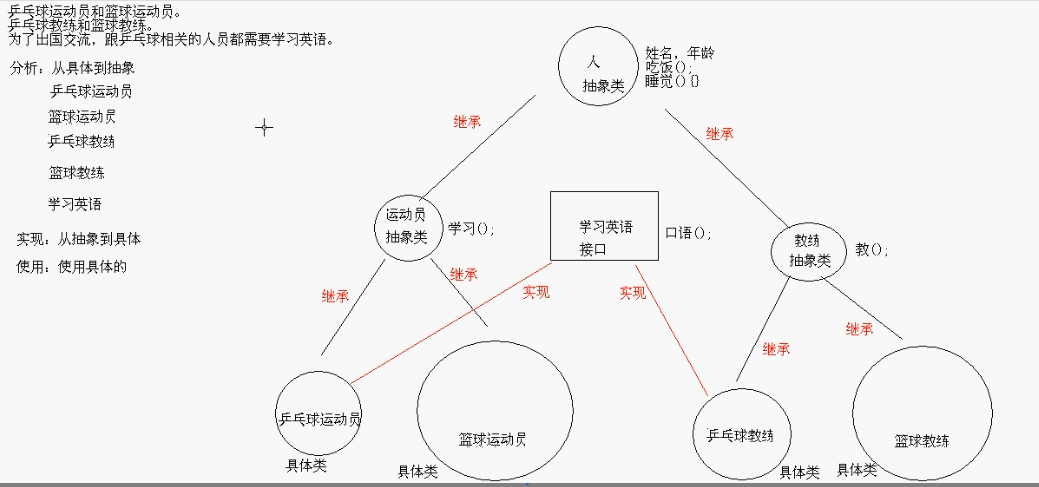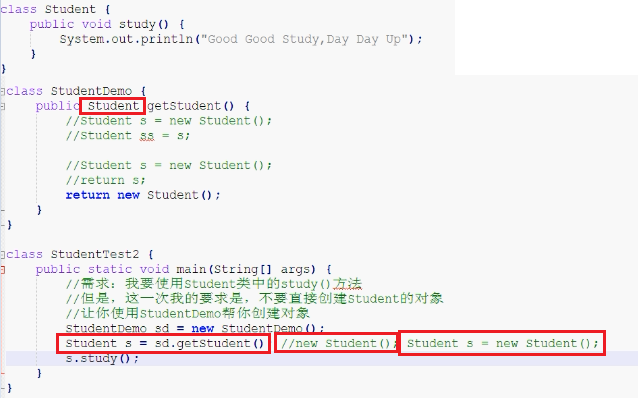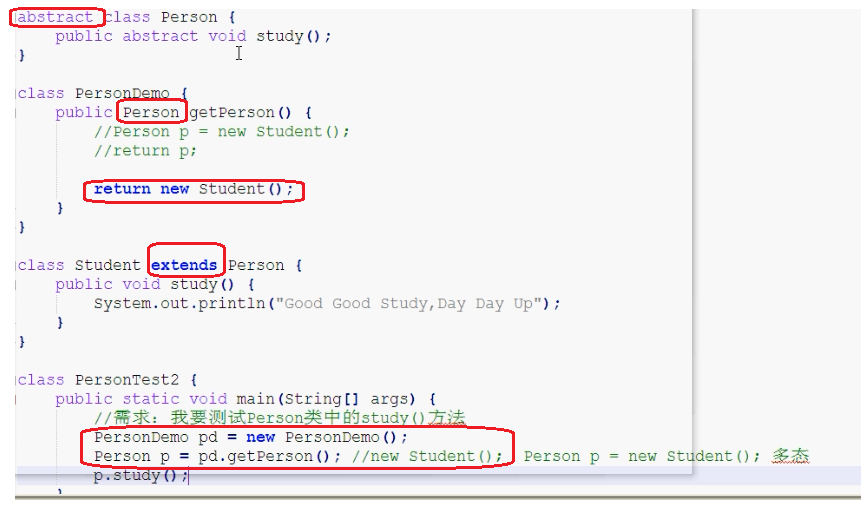2018-07-09 13:29:16
运动员和教练案例

1 /* 2 教练和运动员案例(学生分析然后讲解) 3 乒乓球运动员和篮球运动员。 4 乒乓球教练和篮球教练。 5 为了出国交流,跟乒乓球相关的人员都需要学习英语。 6 请用所学知识: 7 分析,这个案例中有哪些抽象类,哪些接口,哪些具体类。 8 9 整个分析过程,我是通过画图讲解的。 10 */ 11 //定义一个说英语的接口 12 interface SpeakEnglish { 13 //说英语 14 public abstract void speak(); 15 } 16 17 //定义人的抽象类 18 abstract class Person { 19 private String name; 20 private int age; 21 22 public Person() {} 23 24 public Person(String name,int age) { 25 this.name = name; 26 this.age = age; 27 } 28 29 public String getName() { 30 return name; 31 } 32 33 public void setName(String name) { 34 this.name = name; 35 } 36 37 public int getAge() { 38 return age; 39 } 40 41 public void setAge(int age) { 42 this.age = age; 43 } 44 45 //睡觉 46 public void sleep() { 47 System.out.println("人都是要睡觉的"); 48 } 49 50 //吃饭 51 public abstract void eat(); 52 } 53 54 //定义运动员抽象类 55 abstract class Player extends Person { 56 public Player() {} 57 58 public Player(String name,int age) { 59 super(name,age); 60 } 61 62 //学习 63 public abstract void study(); 64 } 65 66 //定义教练抽象类 67 abstract class Coach extends Person { 68 public Coach() {} 69 70 public Coach(String name,int age) { 71 super(name,age); 72 } 73 74 //教 75 public abstract void teach(); 76 } 77 78 //定义乒乓球运动员具体类 79 class PingPangPlayer extends Player implements SpeakEnglish { 80 public PingPangPlayer(){} 81 82 public PingPangPlayer(String name,int age) { 83 super(name,age); 84 } 85 86 //吃 87 public void eat() { 88 System.out.println("乒乓球运动员吃大白菜,喝小米粥"); 89 } 90 91 //学习 92 public void study() { 93 System.out.println("乒乓球运动员学习如何发球和接球"); 94 } 95 96 //说英语 97 public void speak() { 98 System.out.println("乒乓球运动员说英语"); 99 } 100 } 101 102 //定义篮球运动员具体类 103 class BasketballPlayer extends Player { 104 public BasketballPlayer(){} 105 106 public BasketballPlayer(String name,int age) { 107 super(name,age); 108 } 109 110 //吃 111 public void eat() { 112 System.out.println("篮球运动员吃牛肉,喝牛奶"); 113 } 114 115 //学习 116 public void study() { 117 System.out.println("篮球运动员学习如何运球和投篮"); 118 } 119 } 120 121 //定义乒乓球教练具体类 122 class PingPangCoach extends Coach implements SpeakEnglish { 123 public PingPangCoach(){} 124 125 public PingPangCoach(String name,int age) { 126 super(name,age); 127 } 128 129 //吃 130 public void eat() { 131 System.out.println("乒乓球教练吃小白菜,喝大米粥"); 132 } 133 134 //教 135 public void teach() { 136 System.out.println("乒乓球教练教如何发球和接球"); 137 } 138 139 //说英语 140 public void speak() { 141 System.out.println("乒乓球教练说英语"); 142 } 143 } 144 145 //定义篮球教练具体类 146 class BasketballCoach extends Coach { 147 public BasketballCoach(){} 148 149 public BasketballCoach(String name,int age) { 150 super(name,age); 151 } 152 153 //吃 154 public void eat() { 155 System.out.println("篮球教练吃羊肉,喝羊奶"); 156 } 157 158 //教 159 public void teach() { 160 System.out.println("篮球教练教如何运球和投篮"); 161 } 162 } 163 164 class InterfaceDemo { 165 public static void main(String[] args) { 166 //测试运动员(乒乓球运动员和篮球运动员) 167 //乒乓球运动员 168 PingPangPlayer ppp = new PingPangPlayer(); 169 ppp.setName("王浩"); 170 ppp.setAge(33); 171 System.out.println(ppp.getName()+"---"+ppp.getAge()); 172 ppp.eat(); 173 ppp.sleep(); 174 ppp.study(); 175 ppp.speak(); 176 System.out.println("----------------"); 177 //通过带参构造给数据(留给你们) 178 179 //篮球运动员 180 BasketballPlayer bp = new BasketballPlayer(); 181 bp.setName("姚明"); 182 bp.setAge(34); 183 System.out.println(bp.getName()+"---"+bp.getAge()); 184 bp.eat(); 185 bp.sleep(); 186 bp.study(); 187 //bp.speak(); //没有该方法 188 189 //测试教练自己做 190 } 191 }
形式参数:
基本类型:
引用类型:
类:
抽象类:
接口:
1 /* 2 形式参数: 3 基本类型(太简单,不是我今天要讲解的) 4 引用类型 5 类名:(匿名对象的时候其实我们已经讲过了) 需要的是该类的对象 6 抽象类: 7 接口 8 */ 9 class Student { 10 public void study() { 11 System.out.println("Good Good Study,Day Day Up"); 12 } 13 } 14 15 class StudentDemo { 16 public void method(Student s) { //ss; ss = new Student(); Student s = new Student(); 17 s.study(); 18 } 19 } 20 21 class StudentTest { 22 public static void main(String[] args) { 23 //需求:我要测试Student类的study()方法 24 Student s = new Student(); 25 s.study(); 26 System.out.println("----------------"); 27 28 //需求2:我要测试StudentDemo类中的method()方法 29 StudentDemo sd = new StudentDemo(); 30 Student ss = new Student(); 31 sd.method(ss); 32 System.out.println("----------------"); 33 34 //匿名对象用法 35 new StudentDemo().method(new Student()); 36 } 37 }
形式参数:抽象类
抽象类:需要的是该抽象的类子类对象
1 /* 2 形式参数: 3 基本类型(太简单,不是我今天要讲解的) 4 引用类型 5 类名:(匿名对象的时候其实我们已经讲过了)需要的是该类的对象 6 抽象类:需要的是该抽象的类子类对象 7 接口 8 */ 9 abstract class Person { 10 public abstract void study(); 11 } 12 13 class PersonDemo { 14 public void method(Person p) {//p; p = new Student(); Person p = new Student(); //多态 15 p.study(); 16 } 17 } 18 19 //定义一个具体的学生类 20 class Student extends Person { 21 public void study() { 22 System.out.println("Good Good Study,Day Day Up"); 23 } 24 } 25 26 class PersonTest { 27 public static void main(String[] args) { 28 //目前是没有办法的使用的 29 //因为抽象类没有对应的具体类 30 //那么,我们就应该先定义一个具体类 31 //需求:我要使用PersonDemo类中的method()方法 32 PersonDemo pd = new PersonDemo(); 33 Person p = new Student(); 34 pd.method(p); 35 } 36 }
接口:需要的是该接口的实现类对象
1 /* 2 形式参数: 3 基本类型(太简单,不是我今天要讲解的) 4 引用类型 5 类名:(匿名对象的时候其实我们已经讲过了)需要的是该类的对象 6 抽象类:需要的是该抽象的类子类对象 7 接口:需要的是该接口的实现类对象 8 */ 9 //定义一个爱好的接口 10 interface Love { 11 public abstract void love(); 12 } 13 14 class LoveDemo { 15 public void method(Love l) { //l; l = new Teacher(); Love l = new Teacher(); 多态 16 l.love(); 17 } 18 } 19 20 //定义具体类实现接口 21 class Teacher implements Love { 22 public void love() { 23 System.out.println("老师爱学生,爱Java,爱林青霞"); 24 } 25 } 26 27 class TeacherTest { 28 public static void main(String[] args) { 29 //需求:我要测试LoveDemo类中的love()方法 30 LoveDemo ld = new LoveDemo(); 31 Love l = new Teacher(); 32 ld.method(l); 33 } 34 }
返回值类型
基本类型:
引用类型:
类:返回的是该类的对象
抽象类:返回的是该抽象类的子类对象
接口:
返回值类型 引用类型:类:返回的是该类的对象

返回值类型 引用类型:抽象类:返回的是该抽象类的子类对象
